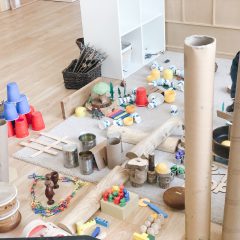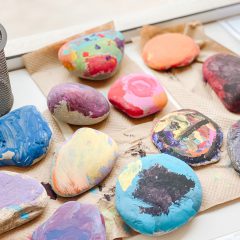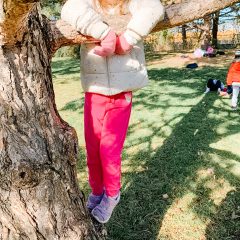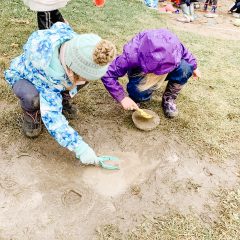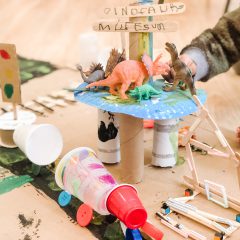REGGIO-INSPIRED EDUCATION

The Reggio Emilia approach is an innovative and inspiring approach to early education.
The cornerstone of the Reggio Emilia approach is its construct of a young child as strong, capable, resilient, and rich with wonder and knowledge. This philosophy understands that students enter the learning environment with a wide range of experiences and ideas that help to frame their future learning. In this approach, students are viewed as having a hundred languages in which to express themselves and it is the responsibility of the educators to observe the learning and expression of each student.
How do we incorporate the Reggio Emilia approach at Vincent Massey Academy?
The image of the child- The foundation of our program at VMA lies within our understanding of the image of the child. The Reggio approach views children as “strong, rich, and capable” individuals. Our role as educators is to understand and listen to each individual student and allow their learning to be represented in ways that are meaningful to each individual child. Our goal in knowing our students, is to provide them with a space that is engaging and full of wonder for each student.
Hundred Languages- The use of a child's hundred languages refers to the idea that every child has infinite potential to discover, learn, and communicate. The idea emphasizes the importance of providing children with many ways to share their thinking of the world around them. As children learn in a variety of ways, teachers ensure they provide many different means for learning and exploring. These means of exploration can include talking, writing, acting, drawing, the use of natural materials, dancing, and whatever else they may feel fit.
Documentation- At VMA, teachers use pedagogical documentation to share, re-evaluate and analyze the work of students. Documentation through photos, videos, and art work allows the focus to be taken away from summative measures of achievement and allows teachers to place an emphasis on the process of learning and display it throughout the classroom. We seek to demonstrate student thinking using quotes and pictures representing the evolution of their understanding of the classroom.
Family Involvement- Parents/guardians are the most important caregivers in their child’s life. VMA strives to make all parents feel welcomed and connected to our school. Families at VMA are a fundamental part of the connection between home and school. A key component in our effort to meet each of the unique and differentiating needs of our students, is through consistent open communication between parents and our team of educators. Family involvement activities are planned regularly throughout the year, which parents are encouraged to participate in.
The environment as the third teacher- At Vincent Massey, high value is placed on a learning environment that supports the development of inquiry, creativity, and free thought. Our renovated classrooms provide an environment that is filled with natural light, order and children's work. The classroom environment is free from clutter and all materials are considered for their purpose to inspire and engage our students. The space respects children as capable, independent learners by providing them with authentic and multi-purpose materials that encourage students to initiate and guide their own learning opportunities, taking agency of their learning.
The learning environments are purposely and thoughtfully designed with child learning at the heart of the designs. Classrooms have open space and natural colours and light, to provide a calm, stable and predictable working environment for our students. Throughout the year, the rooms are filled with student work and expressions, and culturally representative books and artwork. Over time they become a space that represents each classroom individually and the learning that the class has explored.
Teachers as Researcher- The teachers at VMA view themselves as co-constructors of knowledge rather than the all-knowing leaders imparting wisdom. Teachers work to provoke inquiry and intellectual growth by listening to students, extending their discussions, and providing materials. Our teachers value social relationships as essential aspects of all learning. Participation by children, teachers and parents in a community context allows all participants to connect and learn by interacting with one another and their environment.
“OUR TASK, REGARDING CREATIVITY, IS TO HELP CHILDREN CLIMB THEIR OWN MOUNTAINS, AS HIGH AS POSSIBLE. NO ONE CAN DO MORE.”
-LORIS MALAGUZZI


